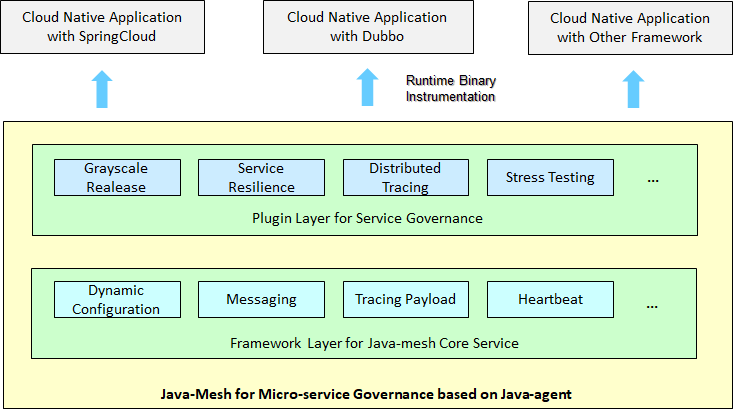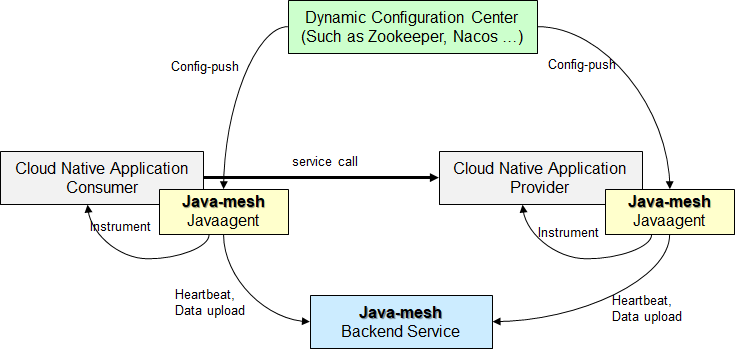Java-mesh is a service mesh technology based on JavaAgent . It leverages the JavaAgent to instrument the host application with enhanced service governance function, in order to solve the service governance problem, in the massive micro-service architecture.
Java-mesh's purpose also includes building a plugin-development ecosystem to help developers develop the service governance function more easily while not interfering the business code. The Java-mesh architecture is depicted as follows.
As described above, Java-mesh's Javaagent has two layers of functions.
- Framework core layer. The core layer provides Java-mesh's basic framework capability, in order to ease the plugin development. The function of this layer includes heart beat, data transmit, dynamic configuration, etc.
- Plugin service layer. The plugin provides actual governance service for the application. The developer can either develop simple plugin by directly leveraging framework core service, or can develop complex plugin by developing plugin's own complex service-governance function.
Java-mesh's Javaagent widely adopts class isolation technology in order to eliminate the class load conflicts between framework code, plugin code, and application code.
A microservice architecture using Java-mesh has the following has the following three components, which is depicted in the following diagram.
- Java-mesh Javaagent: dynamically instrument the application for the service governance capability.
- Java-mesh Backend:provide the connection and the pre-processing service for the Javaagents' all uploaded-data.
- Dynamic configuration center:Providing the instructions by dynamically update the config to the listening Javaagent. Dynamic configuration center is not directly provided by Java-mesh project. The projects currently support servicecomb-kie, etc.
Click here to download JavaMesh binary package. If you will to compile the project yourself, please follow the following steps.
Execute maven command to package the Java-mesh project's demo module.
mvn clean package -Dmaven.test.skip -PexampleExecute maven command to package the Java-mesh project's back-end module.
mvn clean package -Dmaven.test.skip -PbackendStart Java-mesh backend
# Run under Linux
java -jar javamesh-agent-x.x.x/server/javamesh/javamesh-backend-x.x.x.jar# Run under Windows
java -jar javamesh-agent-x.x.x\server\javamesh\javamesh-backend-x.x.x.jarStart Java-mesh demo project:
# Run under Linux
java -cp javamesh-samples/javamesh-example/demo-application/target/demo-application.jar \
-javaagent:javamesh-agent-x.x.x/agent/javamesh-agent.jar=appName=test \
com.huawei.example.demo.DemoApplication# Windows下执行
java -cp ..\javamesh-samples\javamesh-example\demo-application\target\demo-application.jar ^
-javaagent:javamesh-agent-x.x.x\agent\javamesh-agent.jar=appName=test ^
com.huawei.example.demo.DemoApplicationPlease refer to the Development Guide
Java-mesh adopts Apache 2.0 License.
Please read Contribute Guide to refer how to jion the contribution.
- Apache/Servicecomb-java-chassis: Java-mesh refer the service governance algorithm from Apache Servicecomb project.
- Apache/Servicecomb-kie: Java-mesh uses servicecomb-kie as the default dynamic configuration center.
- Apache/SkyWalking: Part of the framework code in Java-mesh is built based on Apache Skywalking project.
- Alibaba/Sentinel: Java-mesh's flow-control plugin is built based on Alibaba Sentinel project.



